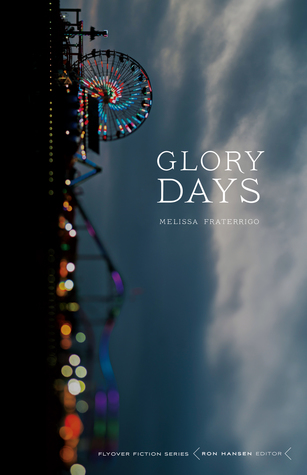The small plains town of Ingleside, Nebraska, is populated by down-on-their-luck ranchers and new money, ghosts and seers, drugs and greed, the haves and the have-nots. Lives ripple through each other to surprising effect, though the connections fluctuate between divisive gulfs and the most intimate closeness. At the center of this novel is the story of Teensy and his daughter, Luann, who face the loss of their land even as they mourn the death of Luann’s mother. On the other end of the spectrum, some townspeople find enormous wealth when developers begin buying up acreages. When Glory Days—an amusement park—is erected, past and present collide, the attachment to the land is fully severed, and the invading culture ushers in even darker times.
In Glory Days Melissa Fraterrigo combines gritty realism with magical elements to paint an arrestingly stark portrait of the painful transitions of twenty-first-century, small-town America. She interweaves a slate of gripping characters to reveal deeper truths about our times and how the new landscape of one culture can be the ruin of another.
(from Goodreads)
More about this collection
Author Melissa Fraterrigo’s website
“Publications in Literary Magazines Validates the Time I Spend Alone at My Desk.”
An interesting interview in which the author describes her process of writing linked short stories:
“I had a great deal of fun writing this book because I approached it very much like a puzzle. The first story, as I mentioned, was “Teensy’s Daughter,” which features Gardner on house arrest after causing the death of Luann, the daughter of his childhood nemesis, Teensy. Unlike previous stories, once I finished the piece the characters returned to me. I had to figure out why Gardner and Teensy hated one another and why Luann kept haunting Gardner. In that one story I had three characters that felt really compelling and I had to backtrack to discover how they ended up at this point in time.
“The next story I wrote didn’t make it in the book, but it informed the book by helping me better understand their hatred for one another and I was able to salvage part of that story to explore in “Skin.” I love Hemingway’s iceberg theory that if a writer of prose knows what she is writing she may omit things and the reader will still feel them—the dignity of moment in an iceberg is due to only one-eighth of it being above water.
…
“For me, as a reader, nothing makes me put a book down faster than when I have the sensation that the author is not interested in my impressions or meaning-making. What I mean by that is the author has figured everything out in the narrative and isn’t interested in spending the time showing me the motivations behind a character. I am asked to accept things at face value and that feels so insulting. My favorite books are those where some gaps remain in the narrative.
“With Glory Days I was really conscious of making sure there were aspects that remained somewhat open to interpretation. I wanted readers to feel welcome to bring their own impressions to the book. Sometimes whole years pass between chapters of the book. What happens during this time? Does the reader need to know? Perhaps in a traditional novel they do require this knowledge, but in a short story cycle, I think all bets are off and each book has the opportunity to stand on its own.”
Once again, I am thrilled to read about another writer’s process and realize how much this – at least in general – reflects my own process, as well as my love for linked short stories!
Quote
“Daddy’s not the only guy Papermill laid off, he’s just the unluckiest, he says. The buckets of ice have turned to water by the time they are done. Some shake Daddy’s hand or squeeze his shoulder. Take care now, they say. We sit on the steps and watch the train of cars leave land that has been in my mother’s family for three generations—land the bank has sold. Dust whorls. We sweat. Vultures spoon the sky.”
– Melissa Fraterrigo, Glory Days

Leave a Reply